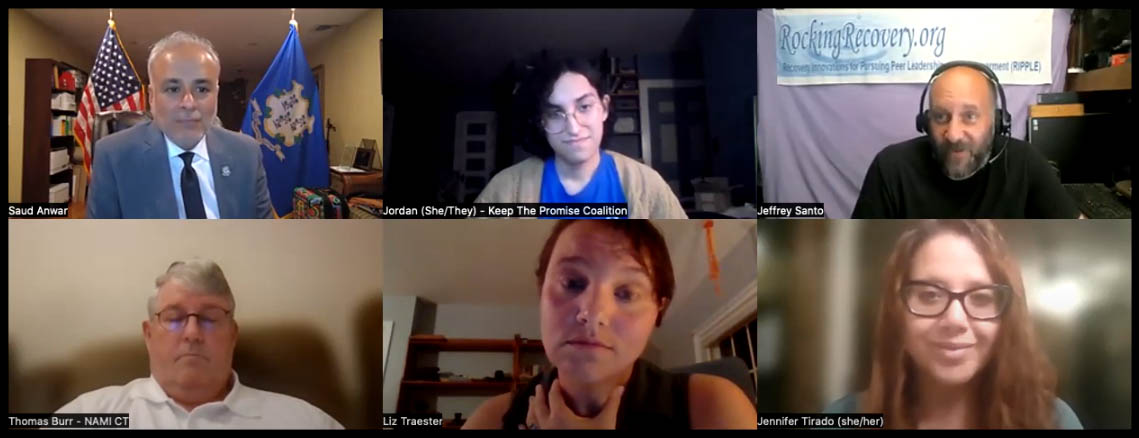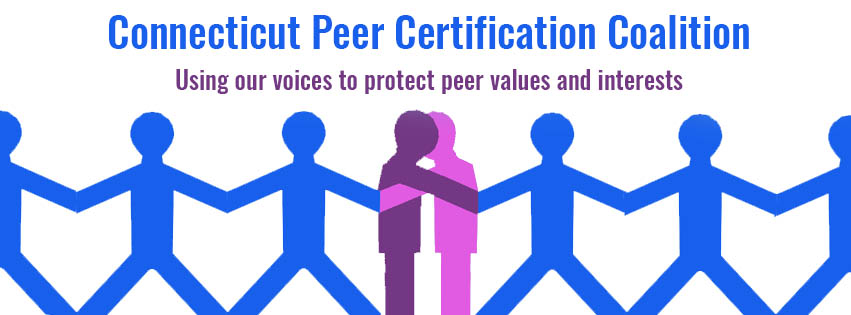
Every once and a while things just fall into place. A moment where the right people come together at the right time and start a conversation. Each person has different lived experiences but shares a common thread through their stories. On August 15th, 2023 members of KTP’s peer respite workgroup met with Senator Anwar. Jordan Fairchild – Keep The Promise Coalition, Jennifer Tirado – Toivo / Advocacy Unlimited, Thomas Burr – National Alliance on Mental Illness Connecticut, Liz Traester – Peer Support Specialist, and Jeffrey Santo of RIPPLE met with the senator for what was supposed to be a 30-minute meeting. We ended up talking for just over an hour and a half. At the end of the meeting, the Senator suggested that since so much good information had been presented we should recreate it on social media for general consumption.

The five-person panel joined Senator Anwar on his Facebook page and live-streamed what we had presented to him in the meeting. He had also done some of his own research talking to a respected psychiatrist and had asked the doctor’s opinion on what we had discussed.
The stream went live on September 13th just before 7:00 PM, a technical glitch at the beginning cut off the first few minutes of Liz’s story, but the full video was uploaded to KTP’s YouTube page a short time later. If you would like to view the full video please check out their page which can be found here: https://www.youtube.com/@keepthepromisecoalition3389
One interesting thing that happened in the discussion was when the senator said we had a question asked in the comments by “Elsa.” The question, “If a peer became overly concerned for a person’s safety, would they reach out to a crisis team?” Elsa Ward, for those of you who don’t know, is the Director of Recovery Community Affairs at DMHAS. She has also sat in on several peer respite work group meetings that we held over Zoom with the people on this panel. Her question served as an example of just how out of touch DMHAS is when it comes to what the peer community is trying to accomplish for our state.
Many of the people who want peer-run respite services do not trust the mental health and addiction system. If it became standard practice to seek out a higher level of care and call crisis services just because someone expressed their true feelings no one would trust respite again.
Page 1
The biggest difference between Peers and DMHAS may be found in how we define the word safe. For DMHAS a safe space means keeping a person in a state where a provider knows they cannot hurt themselves. This practice can include forced hospitalization, forced medication, and forced isolation.
For a peer creating a safe space means building an environment of trust. We believe a person should be able to express their feelings without being punished for it and having their freedoms stripped away. It is for this reason the Alternatives to Suicide groups are so successful. People are free to talk about their feelings around suicide and the thoughts they are having in that moment. Many of the people who attend these groups have lived experiences that involved hospitalization, perhaps that is why they seek out the support of peers rather than the services of a professional provider. After the many conversations we have had Elsa should have already known all of this.
This question also calls back to the failed RFP for peer respite DMHAS put forward this year. A traditional peer-run respite is a home-like environment. Most are in former single-family dwellings. The RFP that DMHAS has put forward is so restrictive they have even mandated the location, 401 West Thames Street, Norwich, CT, 06360. This address is also the location of the Southeast Mental Health Authority. The RFP also called out of 6 beds at this location, the “house” they suggested only has 4 bedrooms. It is common knowledge that anyone seeking respite care would be expecting a private bedroom. An argument can be made that the RFP was written to fail and that it was only created to check off a box just so they could say they addressed respites this year.
Here is the bottom line… There are people in our state who have received services from the DMHAS system who refer to themselves as “psychiatric survivors.” On many, many occasions their stories are shared in the company of their peers during support groups that organizations like Advocacy Unlimited and RIPPLE host.
DMHAS has said that trained peers who use their lived experience to help others are extremely useful which echo statements by SAMHSA. What traditional treatment providers need to come to terms with is just how much of our “lived experience” took place in their offices and hospitals with their doctors and clinicians. It was those experiences, the trauma we endured after the diagnosis that led us to where we are today.
So you see, when it comes to the question of a person’s safety there is a reason most respites have a waiting list and why folks return week after week to the Alternatives 2 Suicide support groups. They already feel safe with us and a person is much less likely to harm themselves once they have gotten to a place they WANT to be.


Out of the Darkness Fairfield County Walk
Date: 10/21/2023
Location: Sherwood Island State Park
(1 Sherwood Island Rd), Westport, CT
Check-in Time: 9:00 am
Walk Start Time: 10:00 am
Page 2

Schedule Change:
Effective November 1st, 2023 to our online peer support offerings
Late Night Peer Support Groups
Tuesday & Thursday from 10:00 PM – 12:00 AM
Our Tuesday and Thursday night groups are still in full swing and will remain unchanged. They will also be using the current Zoom link to avoid any confusion. Sunday nights have been cut from the lineup due to attendance falling over the last year. The farther we move away from the pandemic lockdown the more we see people getting on with their lives and not dropping in as often on the weekends.
Alternatives 2 Suicide / If Your Talking There’s Time (Hybrid Group)
Wednesday, Friday, & Sunday 8:00 PM – 9:30 PM
RIPPLE’s Alternatives 2 Suicide will still hold the same core values and commitment to confidentiality as the regular groups. We are calling this a “hybrid” group due to the addition of a service we plan to offer along with our current level of support. We understand that stress plays a big part in anyone’s emotional well-being and we believe that lifting some of those burdens could go a long way towards bringing a person to a better place.
Since the launch of RockingRecovery.org, we have been searching for the resources people need to get past surviving and move on to a point where they can begin to thrive. We can offer a doorway to those facing food insecurity, housing problems, legal issues, needing a job, reentering the community after incarceration, and so on. Our goal has always been to find resources and get them to the people who are in need.
We know people need more than resources, and in some cases, no amount of resources or services can repair a hurting heart. People grieving the loss of a loved one or fighting an illness would be good examples of the limitations of this hybrid model… But we will still offer the same safe space, compassion, support, and understanding to everyone. This meeting will use the current Zoom link which can be requested by contacting rockingrecovery.org@gmail.com
RSS Community Conversation Group
First Monday of the month 7:00 PM – 8:30 PM
The weekly RSS Community Conversation group was meant for peers who are actively supporting others. A group where we could share resources, find tools, and services to help those they are trying to serve. Most peers contact us through email to request resources which leaves the weekly meetings with a low attendance. For this reason, we are going to a monthly meeting format. We will start talking more about peer certification, training, and legislative matters that may have an impact on the work that we do. This meeting will also use the current RSS Community Conversation link
Page 3

I am part of Generation X and like many my age, grew up watching this man right here. His name was Fred McFeely Rogers, he was an American television host, author, producer, and minister. To the children at the time he was known simply as Mr. Rodgers. When he received the Lifetime Achievement Award he gave a very short and thoughtful speech:
“So many people have helped me to come here to this night. Some of you are here, some are far away and some are even in Heaven. All of us have special ones who loved us into being. Would you just take, along with me, 10 seconds to think of the people who have helped you become who you are, those who cared about you and wanted what was best for you in life. 10 seconds, I’ll watch the time.”
He then paused and allowed everyone time to close their eyes and remember the important people in their lives. A few moments later he continued: “Whomever you’ve been thinking about, how pleased they must be to know the difference you feel they have made. You know they’re kind of people television does well to offer our world. Special thanks to my family, my friends, and my co-workers in Public Broadcasting and Family Communications, and to this Academy for encouraging me, allowing me, all these years to be your neighbor. May God be with you. Thank you very much.”
This speech is one that I think of often and it has changed how I look at the people who come in and out of my own life. Growing up and becoming a young adult the people I thought of were my parents, teachers, scout leaders, and my circle of friends. Over the last decade, this has changed, of course. All of the important people in my past are still very much a part of who I am, but now there are a great deal more.
When I close my eyes and think of the people that got me where I am today a large number of them are peers in our community. If you are reading this you may be one of them. This is why I fight so hard for the advancement of peer support and what it could be in the future. Peers help peers by listening to them and sometimes we help just by being there and holding space. Other times we help by hearing a problem and offering an avenue that may lead towards overcoming that obstacle. The tools of a peer consist of our lived experience, our compassion, our time, and our common sense. We don’t try to medicate a person who is depressed over housing challenges or food insecurities, we try to get them into housing and find them something to eat.
Again, we can look to Mr. Rodgers and one of my favorite stories about him and his show. He changed one small thing in his show after receiving a letter from a little girl who was blind, but who listened to the show every day. “One girl and her family wrote to tell us there was a special reason why she wanted me to talk about feeding the fish each day.” She wrote, “Dear Mister Rogers, Please say when you are feeding your fish, because I worry about them. I can’t see if you are feeding them, so please say you are feeding them out loud. Katie, age 5.” After that letter, Mr. Rogers would narrate himself feeding the fish in each episode with ‘I’m feeding the fish’ which was a common sense way to make that little girl feel better.
In our last newsletter we talked about Peter Bullimore, a voice hearer who spent ten years as a psychiatric patient enduring many bouts of what gets called “paranoia” and unusual beliefs, his story was about a person he worked with who was living with a particular fear. This person believed that if they went outside,
Page 4
they would be attacked and stabbed with a knife. The approach used to help this person was thinking outside the box compared to traditional treatment methods, which is likely why it worked so well.
They purchased a jacket made of a puncture-resistant fabric that would stop a knife. That jacket provided a safety blanket for this person, eventually allowing them to go outside. After a while, when no one tried to harm them, they felt safe and confident enough to go outside without wearing the jacket…. The bottom line is this, peer support will always be more innovative moving forward than traditional treatment methods. This is because we are listening and we believe a person knows what they truly need in their life to take the next steps in their recovery journey.
What I find most interesting is this, after a life full of traditional mental health treatment, hospitalizations, and a half dozen treatment teams, it is what I don’t see when I close my eyes to reflect. I don’t think of a single clinician, social worker, doctor, or nurse. I don’t think of the medications, restraints, or involuntary isolation forced upon me. So when Mr. Rodgers said, “Whomever you’ve been thinking about, how pleased they must be to know the difference you feel they have made.” It stands to reason that the people and things that do not enter your mind were no help at all, and perhaps more harmful than the system would like to admit.



The Connecticut Peer Certification Coalition has been created to sustain the conversation outside the conversation. What does that mean exactly?
The Department of Mental Health and Addiction Services has moved in a new direction with how peer certification will be conducted. Much of this is being done without enough input from our community of peers.
We have created a Facebook group, we hope currently certified peers will join. The goal along with sharing information and ideas is to use Facebook’s polling feature to collect data on subjects relating to the proposed changes. We encourage you to join us, use your voice, and share your thoughts. Go to www.facebook.com/groups/274678481434080 or search for Connecticut Peer Certification Coalition
Nothing about us without us!
Page 5



